-
ORIGINAL ARTICLE10-09-2023
Women’s Childbirth Experiences During COVID-19 Pandemic in Indonesia
Revista Brasileira de Enfermagem. 2023;76:e20220640
Abstract
ORIGINAL ARTICLEWomen’s Childbirth Experiences During COVID-19 Pandemic in Indonesia
Revista Brasileira de Enfermagem. 2023;76:e20220640
DOI 10.1590/0034-7167-2022-0640
Views0See moreABSTRACT
Objective:
Explore in depth the experiences of women giving birth during the COVID-19 pandemic in Indonesia.
Methods:
Qualitative research with a descriptive phenomenological. A total of 16 participants did not suffer from COVID-19 and gave birth during the COVID-19 pandemic in the community setting area.
Results:
There are five themes: 1: Feelings of anxiety and fear of giving birth in hospitals are experienced by women giving birth during the COVID-19 pandemic, 2. Screening for COVID and health protocols applied in hospitals during the COVID-19 pandemic, 3. Support from husbands, families, and health workers is needed when giving birth during the COVID-19 pandemic, 4. Lack of family visits hours is an obstacle during childbirth, particularly during the COVID-19 pandemic, and 5: Bonding attachment between mother and baby while at the hospital.
Conclusion:
Optimal maternity nursing care and supporting health facilities and public policies will help mothers give birth during the COVID-19 pandemic in Indonesia.
-
10-09-2023
Patient safety with covid-19 in hospital units: a scoping review
Revista Brasileira de Enfermagem. 2023;76:e20220557
Abstract
Patient safety with covid-19 in hospital units: a scoping review
Revista Brasileira de Enfermagem. 2023;76:e20220557
DOI 10.1590/0034-7167-2022-0557
Views0See moreABSTRACT
Objective:
Map, in the scientific literature, the actions taken to promote the safety of patients with covid-19 in the hospital context.
Methods:
This is a scoping review according to the Joanna Briggs Institute, using the Checklist Preferred Reporting Items for Systematic Reviews and Meta-Analyses Extension for Scoping Reviews. In April 2022, searches were performed on nine data sources. The results were summarized in a table and analyzed descriptively.
Results:
Fifteen studies were selected to compose the final sample. Most articles refer to cohort studies, followed by clinical trials. As for the areas of activity, there was a predominance of surgical centers, followed by adult and pediatric Intensive Care Units.
Conclusions:
With this review, it was possible to map measures such as contingency plans and reorganization of beds, rooms, and operating rooms, in addition to the isolation and distancing practiced by patients and professionals.
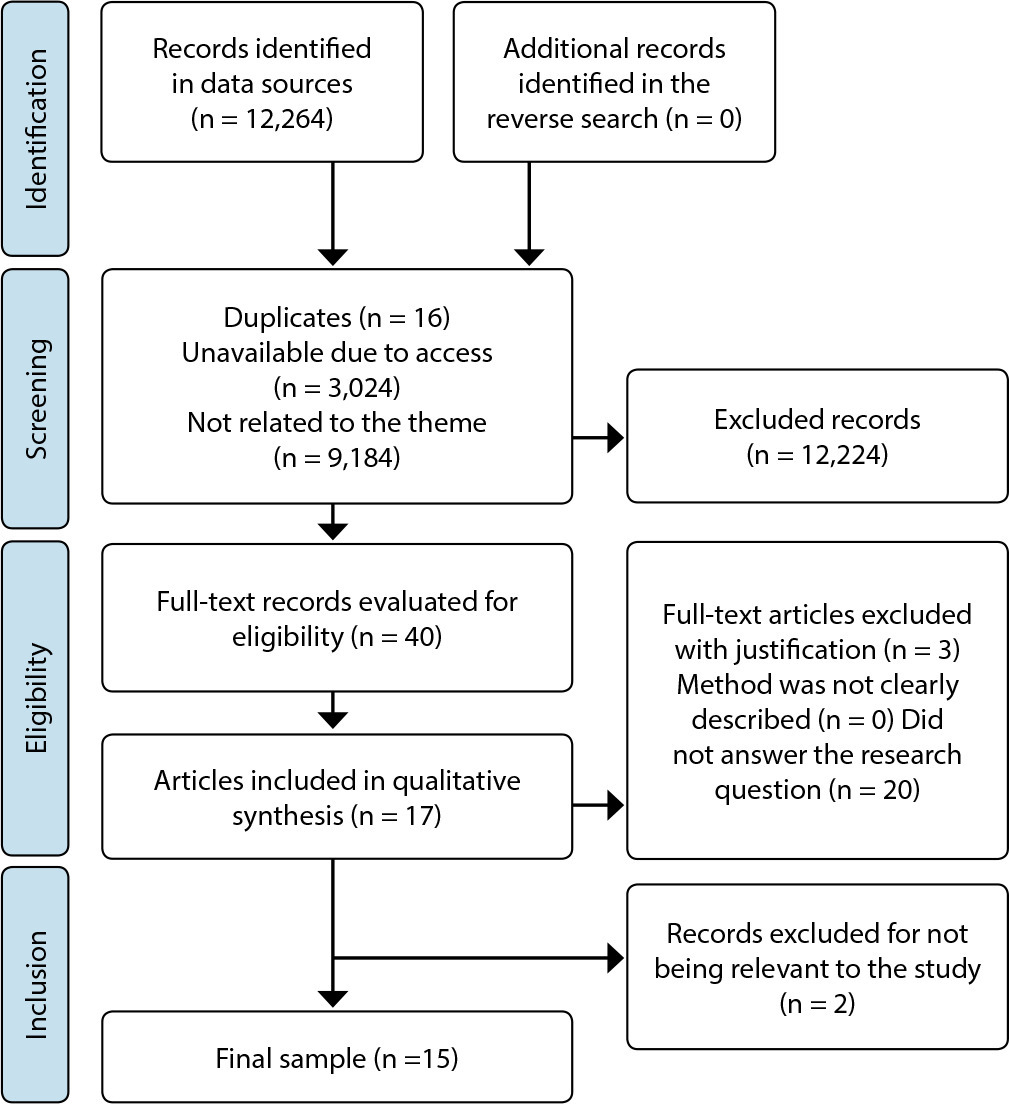
-
10-09-2023
A pós-pandemia de COVID-19: perspectivas da atuação profissional na enfermagem
Revista Brasileira de Enfermagem. 2023;76:e76Suppl101
Abstract
A pós-pandemia de COVID-19: perspectivas da atuação profissional na enfermagem
Revista Brasileira de Enfermagem. 2023;76:e76Suppl101
DOI 10.1590/0034-7167.202376Suppl101pt
Views0Durante a pandemia de COVID-19, os trabalhadores de enfermagem foram essenciais na prestação de cuidados à saúde, diante do elevado número de pessoas infectadas pelos vírus SARS-CoV-2 e adoecidos pela COVID-19 e pela Síndrome Respiratória Aguda Grave (SRAG). Neste contexto, os serviços de saúde ficaram sobrecarregados, e muitos de seus profissionais adoeceram e morreram.A enfermagem […]See more -
ORIGINAL ARTICLE10-09-2023
Transition of care in post-hospitalization patients due to covid-19 in a hospital in northeastern Brazil
Revista Brasileira de Enfermagem. 2023;76:e20230030
Abstract
ORIGINAL ARTICLETransition of care in post-hospitalization patients due to covid-19 in a hospital in northeastern Brazil
Revista Brasileira de Enfermagem. 2023;76:e20230030
DOI 10.1590/0034-7167-2023-0030
Views0See moreABSTRACT
Objective:
To analyze the transition of care for post-hospitalization patients due to covid-19 in a hospital in northeastern Brazil.
Methods:
Quantitative, cross-sectional, descriptive, and analytical study carried out between 2020 and 2021. The sample had 78 patients. Data collection took place by telephone with the support of a sociodemographic questionnaire and the care transition assessment instrument (Care Transitions Measure).
Results:
The average length of stay was 24.04 days. The average score for care transition was 71.68 (±11.71). “Self-management training” and “Understanding of medications” had higher averages, 75.15 (±13.76) and 74.10 (±16.20).
Conclusions:
The average length of stay was 24.04 days. The average score for care transition was 71.68 (±11.71). “Self-management training” and “Understanding of medications” had higher averages, 75.15 (±13.76) and 74.10 (±16.20).
-
10-09-2023
Experiências de parto de mulheres durante a pandemia de COVID-19 na Indonésia
Revista Brasileira de Enfermagem. 2023;76:e20220640
Abstract
Experiências de parto de mulheres durante a pandemia de COVID-19 na Indonésia
Revista Brasileira de Enfermagem. 2023;76:e20220640
DOI 10.1590/0034-7167-2022-0640
Views0See moreRESUMEN
Objetivo:
Explorar en profundidad las experiencias de las mujeres que dieron a luz durante la pandemia de COVID-19 en Indonesia.
Métodos:
Investigación cualitativa con enfoque fenomenológico descriptivo. Un total de 16 participantes que no sufrieron de COVID-19 dieron a luz durante la pandemia de COVID-19 en el entorno comunitario.
Resultados:
Hay cinco temas: 1: Los sentimientos de ansiedad y miedo de dar a luz en los hospitales son experimentados por las mujeres que dan a luz durante la pandemia de COVID-19, 2. Detección de COVID y protocolos de salud aplicados en los hospitales durante la pandemia de COVID-19, 3. Se necesita el apoyo de esposos, familias y trabajadores de la salud cuando se da a luz durante la pandemia de COVID-19, 4. La falta de horarios de visitas familiares es un obstáculo durante el parto, particularmente durante la pandemia de COVID-19, y 5: Vínculo entre madre y bebé mientras están en el hospital.
Conclusión:
la atención de enfermería de maternidad óptima y el apoyo de los centros de salud y las políticas públicas ayudarán a las madres a dar a luz durante la pandemia de COVID-19 en Indonesia.
-
10-09-2023
Comportamentos saudáveis e risco de doenças cardiovasculares entre docentes de enfermagem durante a pandemia de COVID-19
Revista Brasileira de Enfermagem. 2023;76:e20220372
Abstract
Comportamentos saudáveis e risco de doenças cardiovasculares entre docentes de enfermagem durante a pandemia de COVID-19
Revista Brasileira de Enfermagem. 2023;76:e20220372
DOI 10.1590/0034-7167-2022-0372
Views0See moreRESUMEN
Objetivo:
Las enfermedades cardiovasculares son la primera causa de muerte en todo el mundo. La adopción de hábitos de vida que promuevan la salud mantendrá la salud cardiovascular del individuo y reducirá el riesgo de enfermedades cardiovasculares.
Métodos:
En este estudio descriptivo, se encuestó a 150 profesores de enfermería mediante un método de muestreo no probabilístico (intencional) para evaluar su adhesión a un estilo de vida promotor de la salud con el fin de conocer el riesgo de enfermedades cardiovasculares. Para ello, se utilizó la versión árabe del Health-Promoting Lifestyle Profile II (HPLP-II).
Resultados:
Setenta y dos profesores de enfermería completaron la encuesta. Los resultados indicaron que la muestra del estudio tenía un nivel moderado de promoción de la salud basado en el Health-Promoting Lifestyle Profile II.
Conclusión:
Los profesores de enfermería corren el riesgo de desarrollar enfermedades cardiovasculares en función de sus comportamientos de promoción de la salud, ya que obtuvieron una puntuación baja en responsabilidad de salud, actividad física y gestión del estrés. Se recomienda impulsar comportamientos saludables para prevenir enfermedades crónicas como las cardiovasculares.
-
10-09-2023
The post-COVID-19 pandemic: perspectives of professional practice in nursing
Revista Brasileira de Enfermagem. 2023;76:e76Suppl101
Abstract
The post-COVID-19 pandemic: perspectives of professional practice in nursing
Revista Brasileira de Enfermagem. 2023;76:e76Suppl101
DOI 10.1590/0034-7167.202376Suppl101
Views0During the COVID-19 pandemic, nursing workers were essential in providing health care, given the high number of people infected with SARS-CoV-2 viruses and sick with COVID-19 and Severe Acute Respiratory Syndrome (SARS). In this context, health services were overloaded, and many of their professionals fell ill and died.Nursing proved to be essential during the critical […]See more -
10-06-2023
Evidências do cuidado centrado no paciente no contexto da prática profissional de saúde brasileira
Revista Brasileira de Enfermagem. 2023;76(5):e20220448
Abstract
Evidências do cuidado centrado no paciente no contexto da prática profissional de saúde brasileira
Revista Brasileira de Enfermagem. 2023;76(5):e20220448
DOI 10.1590/0034-7167-2022-0448
Views0See moreRESUMEN
Objetivos:
analizar las actitudes centradas en el paciente en el cuidado y compartir prácticas de profesionales de enfermería, logopedia, odontología y medicina.
Métodos:
se utilizó una investigación transversal con 411 profesionales, y como medida de resultado se aplicó el instrumento Patient-Practitioner Orientation Scale.
Resultados:
los médicos presentaron puntuaciones medias más altas, lo que refleja una orientación centrada en el paciente, control compartido y enfoque en la persona, con diferencia estadística para todos los dominios (p<0,02). Los odontólogos fueron los profesionales que presentaron puntajes más bajos, especialmente en el dominio compartir, con diferencia estadística en relación a los enfermeros, logopedas y médicos (p<0,05).
Conclusiones:
finalmente, las actitudes de los profesionales de las áreas de salud estudiadas indicaron preferencia autorreferida por la centralidad en los pacientes. En este contexto, el cuidado centrado en el paciente puede ser un recurso importante en el cuidado de la salud cuando se apuesta por la superación del objeto hombre.
-
02-05-2021
Contents related to nursing professionals during the COVID-19 pandemic on the Youtube™ platform
Revista Brasileira de Enfermagem. 2021;74:e20200581
Abstract
Contents related to nursing professionals during the COVID-19 pandemic on the Youtube™ platform
Revista Brasileira de Enfermagem. 2021;74:e20200581
DOI 10.1590/0034-7167-2020-0581
Views0See moreABSTRACT
Objective:
to characterize the content of Youtube™ videos related to nursing professionals during the COVID-19 pandemic.
Method:
a qualitative study that examined 47 videos on Youtube™ posted between 11/03 and 11/04 2020, which were subjected to thematic analysis.
Results:
four categories emerged: “the role of nurses in care production during the pandemic”, which addresses the management of services and individual care; “Overview of the pandemic from the perspective of nurses in different countries”, presenting experiences and encouraging physical distance; “Tributes and motivation to mobilize the category”, in addition to targeted tributes, calls for nurses to claim their rights; “Criticisms and demands to improve working conditions”, which highlights the insecurity of care provision settings.
Final considerations:
nursing work conditions in different countries, recognition of the importance of professionals during the pandemic, and claims of the category to improve working conditions were the main content found on Youtube™.
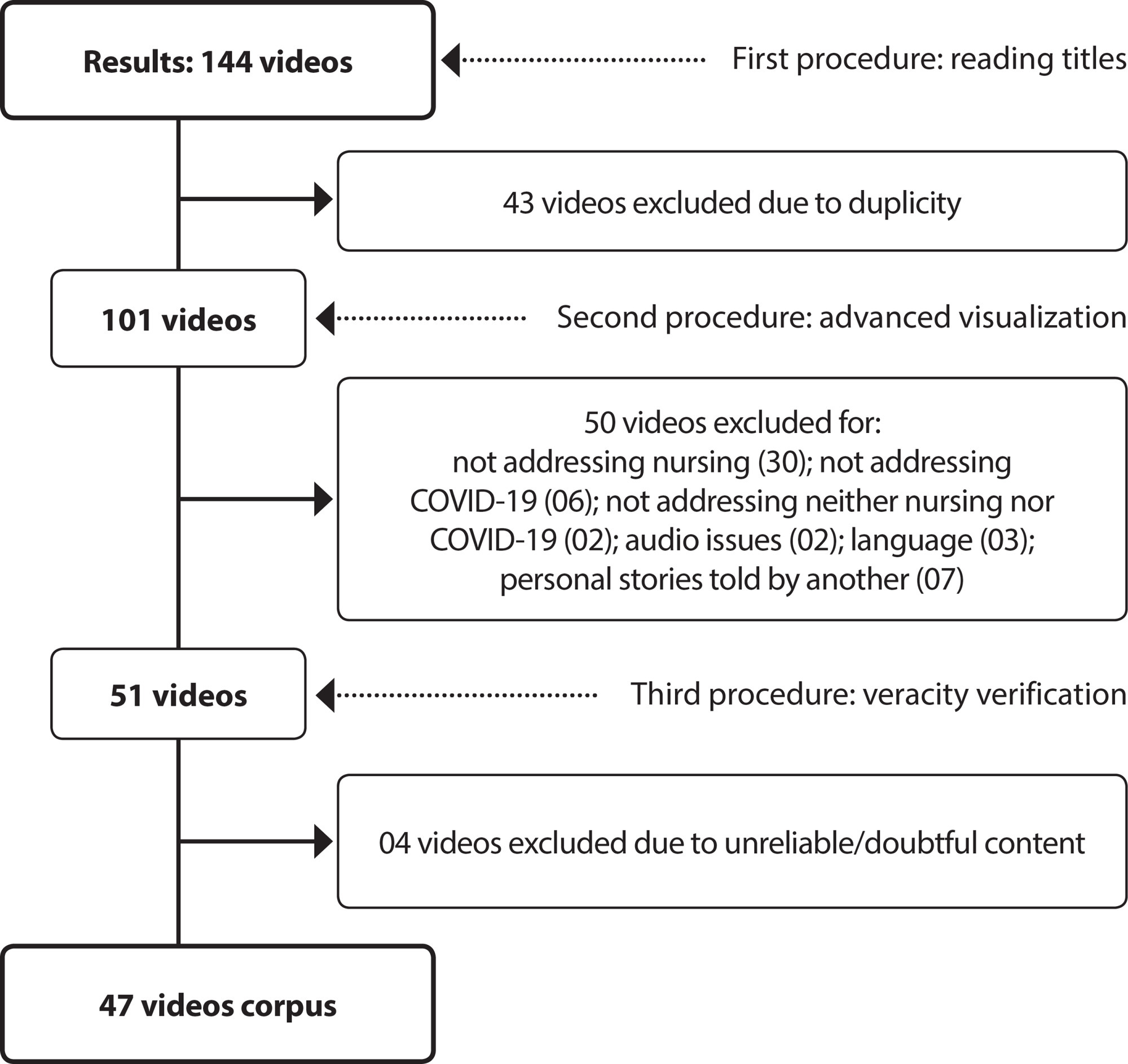
-
REVIEW07-13-2020
Prevention and control measures for neonatal COVID-19 infection: a scoping review
Revista Brasileira de Enfermagem. 2020;73:e20200467
Abstract
REVIEWPrevention and control measures for neonatal COVID-19 infection: a scoping review
Revista Brasileira de Enfermagem. 2020;73:e20200467
DOI 10.1590/0034-7167-2020-0467
Views0See moreABSTRACT
Objective:
to identify with the literature the measures to prevent and control neonatal infection by COVID-19.
Methods:
a scope review carried out by searching for studies in databases and institutional health websites. The final sample was 25 articles.
Results:
among the main measures are the use of masks by suspected or infected people in contact with healthy newborns, hand hygiene before and after each care and feeding as well as the tools used for milking. It is indispensable to use personal protective equipment by health professionals in neonatology services to maintain a private room for infected newborns or to use physical barriers. Early diagnosis and timely case management is essential to reduce virus transmissibility.
Conclusions:
the research contributed to elucidate health and nursing actions in preventing and controlling neonatal infection by COVID-19.

-
REVIEW06-17-2020
Prevention and conduct against the Extravasation of antineoplastic chemotherapy: a scoping review
Revista Brasileira de Enfermagem. 2020;73(4):e20190008
Abstract
REVIEWPrevention and conduct against the Extravasation of antineoplastic chemotherapy: a scoping review
Revista Brasileira de Enfermagem. 2020;73(4):e20190008
DOI 10.1590/0034-7167-2019-0008
Views0See moreABSTRACT
Objectives:
to identify and synthesize scientific evidence on prevention and management of extravasation of antineoplastic agents in adult patients by nurses.
Methods:
scoping review, according to Joanna Briggs Institute and PRISMA-ScR. Research was conducted in five electronic databases, Cochrane Library and eight catalogs of theses and dissertations. Data collection occurred from April to July 2018, with no time limit. The extracted data were analyzed and synthesized in a narrative way.
Results:
a total of 3,110 records were retrieved and 18 studies were kept for review. Most publications (66.6%) had a qualitative approach and addressed both aspects, i.e., prevention and management of extravasation of chemotherapy in adult patients.
Conclusions:
the implementation of protocols based on scientific evidence on prevention and management of extravasation of antineoplastic agents is paramount in order to provide patient safety and support to the nursing staff.
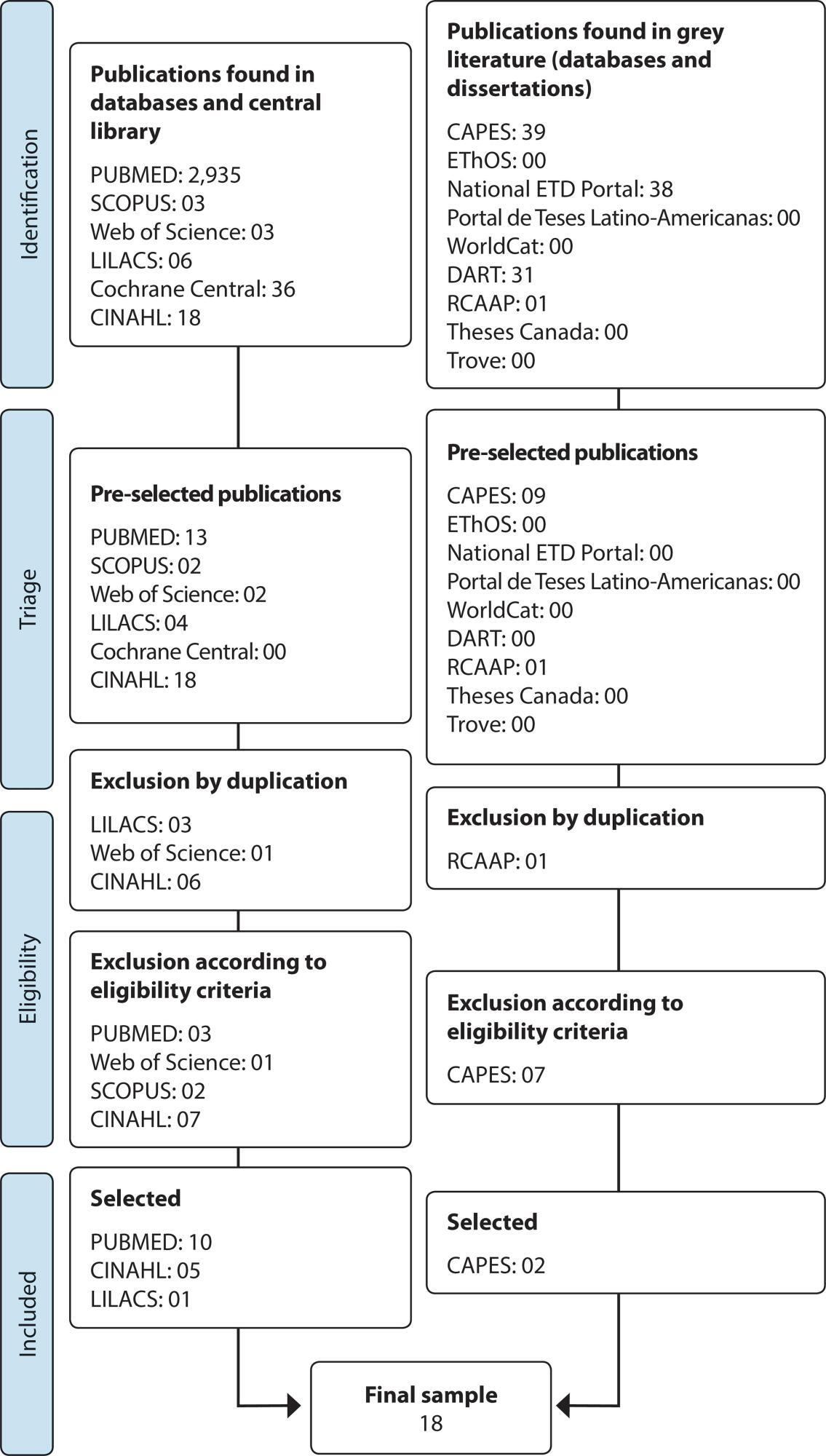
-
REFLECTION09-07-2020
Training and work process in Multiprofessional Residency in Health as innovative strategy
Revista Brasileira de Enfermagem. 2020;73(6):e20190635
Abstract
REFLECTIONTraining and work process in Multiprofessional Residency in Health as innovative strategy
Revista Brasileira de Enfermagem. 2020;73(6):e20190635
DOI 10.1590/0034-7167-2019-0635
Views0See moreABSTRACT
Objectives: To
reflect about education in health and work process on three programs of multiprofessional residency in Florianópolis/SC.
Method:
Reflexive study about Multiprofessional Residency Health Programs of Florianópolis.
Results:
Multiprofessional Residency characterizes training health professionals through service education. Developing these professionals’ specialization with assignments that promote professional exercise and magnifies multiprofessional work at the same time, for excellency in unabridged healthcare.
Final Considerations:
Multiprofessional Residency Programs make interdisciplinary education, sharing knowledge between residents and other professionals stimulating development of innovation skills.
-
ORIGINAL ARTICLE06-08-2020
Understanding the dramatic therapeutic play session: a contribution to pediatric nursing
Revista Brasileira de Enfermagem. 2020;73(4):e20180812
Abstract
ORIGINAL ARTICLEUnderstanding the dramatic therapeutic play session: a contribution to pediatric nursing
Revista Brasileira de Enfermagem. 2020;73(4):e20180812
DOI 10.1590/0034-7167-2018-0812
Views0See moreABSTRACT
Objectives:
to understand how the dramatic therapeutic play session occurs within the care of hospitalized children.
Methods:
qualitative multiple case study, using theoretical references, such as symbolic interactionism and Vygotsky’s theory of symbolic play. Twenty play sessions performed with six children from 3 to 10 years old were analyzed, each corresponding to one case.
Results:
these sessions demonstrated that a dramatic therapeutic play session is a process of four interdependent and complementary steps: bonding, exploring, dramatizing, and play cessation. They also revealed the imaginary situations externalized by the child, the importance of the exploration step for which they manage the imaginary situation and catharsis, and how her higher psychological faculties are articulated during this process.
Final Considerations:
the results contribute to the understanding of the conduct and analysis of the dramatic therapeutic play session, reinforcing the importance of its use in pediatric nursing care practice.
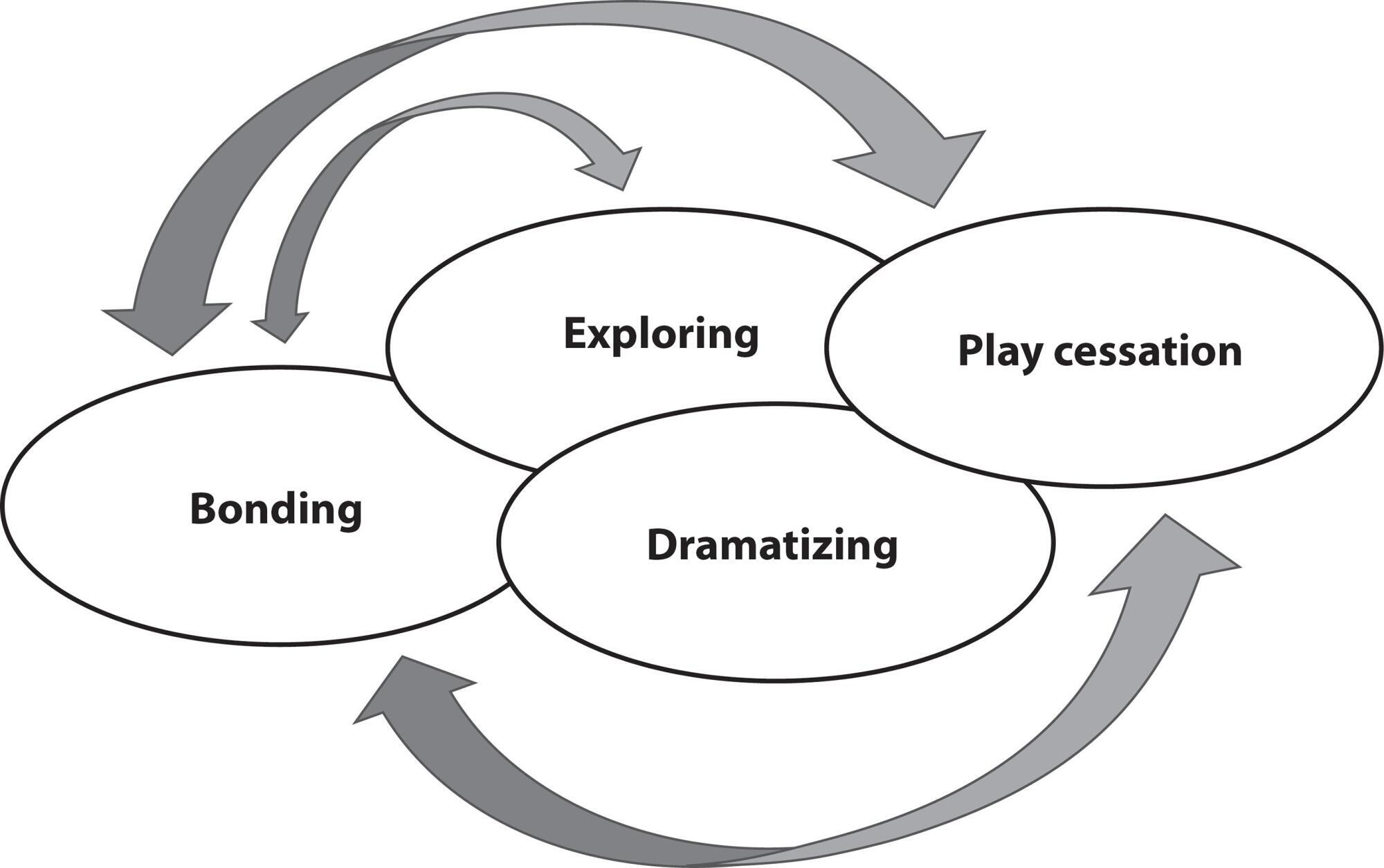
-
ORIGINAL ARTICLE02-10-2020
Motivation and difficulties to reduce or quit smoking
Revista Brasileira de Enfermagem. 2020;73(1):e20180188
Abstract
ORIGINAL ARTICLEMotivation and difficulties to reduce or quit smoking
Revista Brasileira de Enfermagem. 2020;73(1):e20180188
DOI 10.1590/0034-7167-2018-0188
Views0See moreABSTRACT
Objective:
To understand what factors motivate people to reduce or stop tobacco use and what difficulties they face in this process.
Method:
Qualitative, empirical and interpretative research that used a focal group technique for data collection and Discourse Analysis as a theoretical reference for analysis.
Results:
The responses centered on the following aspects: motivation for reduction or cessation of smoking, family and community support received during treatment, benefits from cessation of tobacco, difficulties encountered and strategies for overcoming triggers.
Final Considerations:
The results showed that the users expressed their desire for cessation of tobacco use and that to achieve this goal, family and group support, professional help and changing habits are key factors for this process.
-
ORIGINAL ARTICLE02-10-2020
Common mental disorders in nursing students of the professionalizing cycle
Revista Brasileira de Enfermagem. 2020;73(1):e20180154
Abstract
ORIGINAL ARTICLECommon mental disorders in nursing students of the professionalizing cycle
Revista Brasileira de Enfermagem. 2020;73(1):e20180154
DOI 10.1590/0034-7167-2018-0154
Views0See moreABSTRACT
Objectives:
to verify the suspicion of common mental disorders in nursing students of the professionalizing cycle and the association with sociodemographic features.
Method:
cross-sectional study with a sample of 85 students from a public university in the state of Rio de Janeiro (RJ) who responded to the Self-Report Questionnaire-20 and sociodemographic questions.
Results:
the suspicion prevalence of common mental disorders (CMD) in the sample was 55.3% and it was identified the association with the consumption of alcohol. Of the most frequent SRQ-20 complaints, 95.3% reported “feeling nervous, tense or worried”, 72.9% “having difficulty making decisions”, 60% “sleeping poorly” and 37.6% “having lost interest by things “.
Conclusion:
high prevalence of CMD in the sample and the association with the consumption of alcohol requires preventive and therapeutic actions among the students that minimize the possibility of severe mental disorders related to the consumption of alcohol and other drugs.
-
ORIGINAL ARTICLE06-27-2019
Insertion of central vascular catheter: adherence to infection prevention bundle
Revista Brasileira de Enfermagem. 2019;72(3):774-779
Abstract
ORIGINAL ARTICLEInsertion of central vascular catheter: adherence to infection prevention bundle
Revista Brasileira de Enfermagem. 2019;72(3):774-779
DOI 10.1590/0034-7167-2018-0124
Views0See moreABSTRACT
Objective:
To evaluate the compliance of the care process involving insertion of central vascular catheter (CVC) in hemodialysis.
Method:
Cross-sectional quantitative approach developed at the hemodialysis service of a reference hospital in Sergipe, Brazil. Sample consisting of 1,342 actions evaluated, corresponding to 122 forms for monitoring and control of CVC insertion. Data collection was held from July to December 2016.
Results:
The adherence rate to the use of the insertion form was 54.9%. The procedure evaluated achieved 93% overall compliance. Of the 11 specific actions observed, seven (64%) presented 100% compliance. The density of the overall incidence of primary bloodstream infections reduced from 10.6 to 3.1 infections per 1,000 patients/day.
Conclusion:
Although the observed actions reached specific desired conformities, the use of the checklist was lower than expected. Strategies for monitoring, coaching and educational and organizational actions can contribute to safe care.
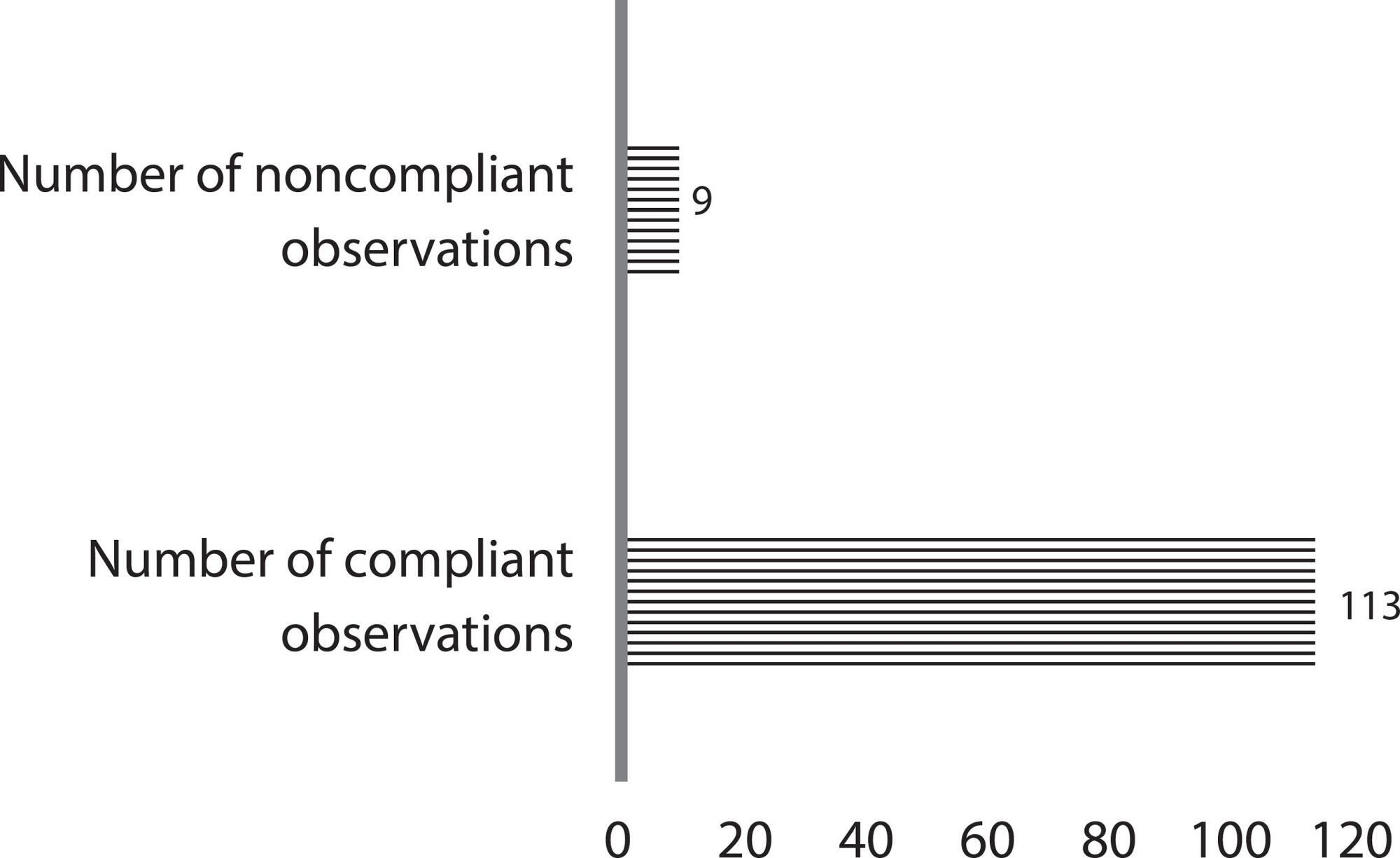
Search
Search in:
Nuvem de Tags
Adolescente (85) Atenção Primária à Saúde (239) COVID-19 (91) Criança (91) Cuidados de Enfermagem (269) Educação em Enfermagem (151) Educação em Saúde (139) Enfermagem (930) Enfermagem Pediátrica (86) Estudantes de Enfermagem (77) Estudos de Validação (131) Família (87) Idoso (208) Promoção da Saúde (99) Qualidade de Vida (104) Saúde do Trabalhador (86) Saúde Mental (145) Saúde Pública (82) Segurança do Paciente (150) Tecnologia Educacional (100)



